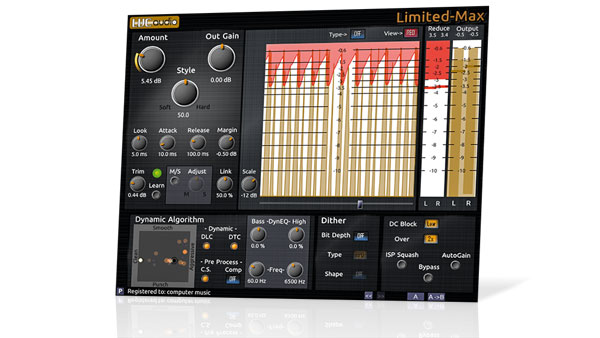MusicRadar Verdict
Limited-MAX is a flexible master bus limiter that delivers results on a par with the more pricey competition. Impressive!
Pros
- +
Good visual feedback. Strong results. Plenty of features. Thorough documentation. X/Y pad is innovative. Competitively priced.
Cons
- -
Interface is rather ugly.
MusicRadar's got your back
We all want our mixes to sound as good as possible, so when an intriguing new limiter plugin like Limited-MAX comes along, our ears prick up. LVC-Audio is a relative newcomer on the music software scene, but it's already impressed us with its saturator, HotPhuzz, so expectations are high.
Limited-MAX (VST/AU/RTAS/AAX) immediately brings FabFilter's superb Pro-L to mind, with its large scrolling Waveform History, which displays the audio output level along the bottom and the gain reduction amount at the top.
"If you're up for adding another limiter to your plugins arsenal, Limited- MAX stands as a very solid investment"
The time window is sized using the horizontal fader below, and the vertical scale can be switched from the default 0dBFS to settings based on K-12, K-14 and K-20 systems. There's also an Out meter with Peak and RMS level indicators, and a secondary meter that can be set to show Gain Reduction, Input, Inter-Sample Peak and estimated Distortion.
On the metering and visual feedback front, then, it's all very comprehensive and useful stuff - but what of Limited-MAX's processing?
The effect has three large main controls: the self- explanatory gain reduction Amount and Output level, plus the less obvious Style. This can be set anywhere between 0 (Soft) and 100 (Hard), and controls three under-the-hood parameters: steepness of compression ratio, compression knee width, and release time, which is program dependant (ie, variable, depending on the amplitude level of the incoming signal) at values below 50.
So, to cut a long story short, lower Style values give a more analogue-style sound, while higher values result in a more modern, 'digital' feel. It's a sensible, straightforward concept, and it really is possible to get good results using just these three main knobs.
There's no limit
If you want to get the most from Limited-MAX, you'll need to investigate its other settings, of which there are many. The most important are Look (lookahead) and Trim. Look determines how far ahead the plugin analyses: longer times generally encourage transparency, but extreme values can lead to pumping.
Trim adjusts the input level, and features a coloured indicator light that shows whether the input signal is too loud, too quiet or in the correct range. There's also a Trim Learn button that analyses the input signal and sets the Trim correctly - this takes a few moments to do its thing, but is as useful as it sounds.
Having the Trim set right is important for getting optimum results from the effect's clipper and peak saturator algorithms, which are dialled in using an X/Y pad.
The timing of the gain reduction envelope is controlled with standard Attack and Release knobs, and the limiter can be toggled between left/right and mid/side modes.
In mid/side mode, the Adjust knob becomes active, used to control the balance of the limiting: turn it up to limit the sides channel more; turn it down to limit the mid channel more.
You can also couple the limiting of the left/right or mid/side signals with the Link knob: at 0%, they function independently; while at 100%, gain reduction is averaged between the two. Other bells and whistles include dithering options and up to 8x oversampling.
Limited-MAX delivers fantastic results, giving the considerably more expensive competition a good run for its money. If you're up for adding another limiter to your plugins arsenal, Limited- MAX stands as a very solid investment.
Computer Music magazine is the world’s best selling publication dedicated solely to making great music with your Mac or PC computer. Each issue it brings its lucky readers the best in cutting-edge tutorials, need-to-know, expert software reviews and even all the tools you actually need to make great music today, courtesy of our legendary CM Plugin Suite.
“A synthesizer that is both easy to use and fun to play whilst maintaining a decent degree of programming depth and flexibility”: PWM Mantis review
“I feel like that song had everything we needed to come back with”: Bring Me The Horizon’s Lee Malia on Shadow Moses, its riff and the secrets behind its tone, and why it was the right anthem at the right time
“I said, ‘Are we sure we can write a song about death?’”: The story of Mike + The Mechanics' classic No.1 The Living Years











